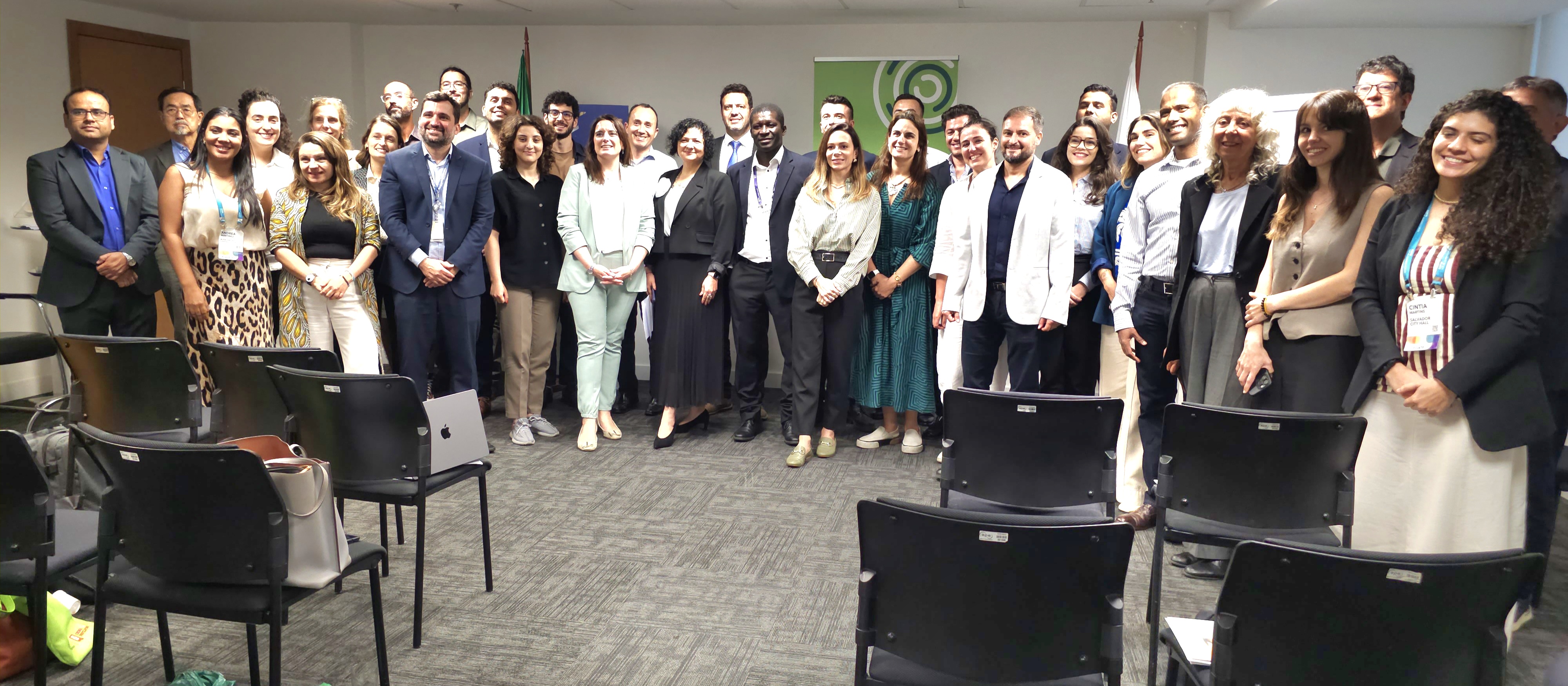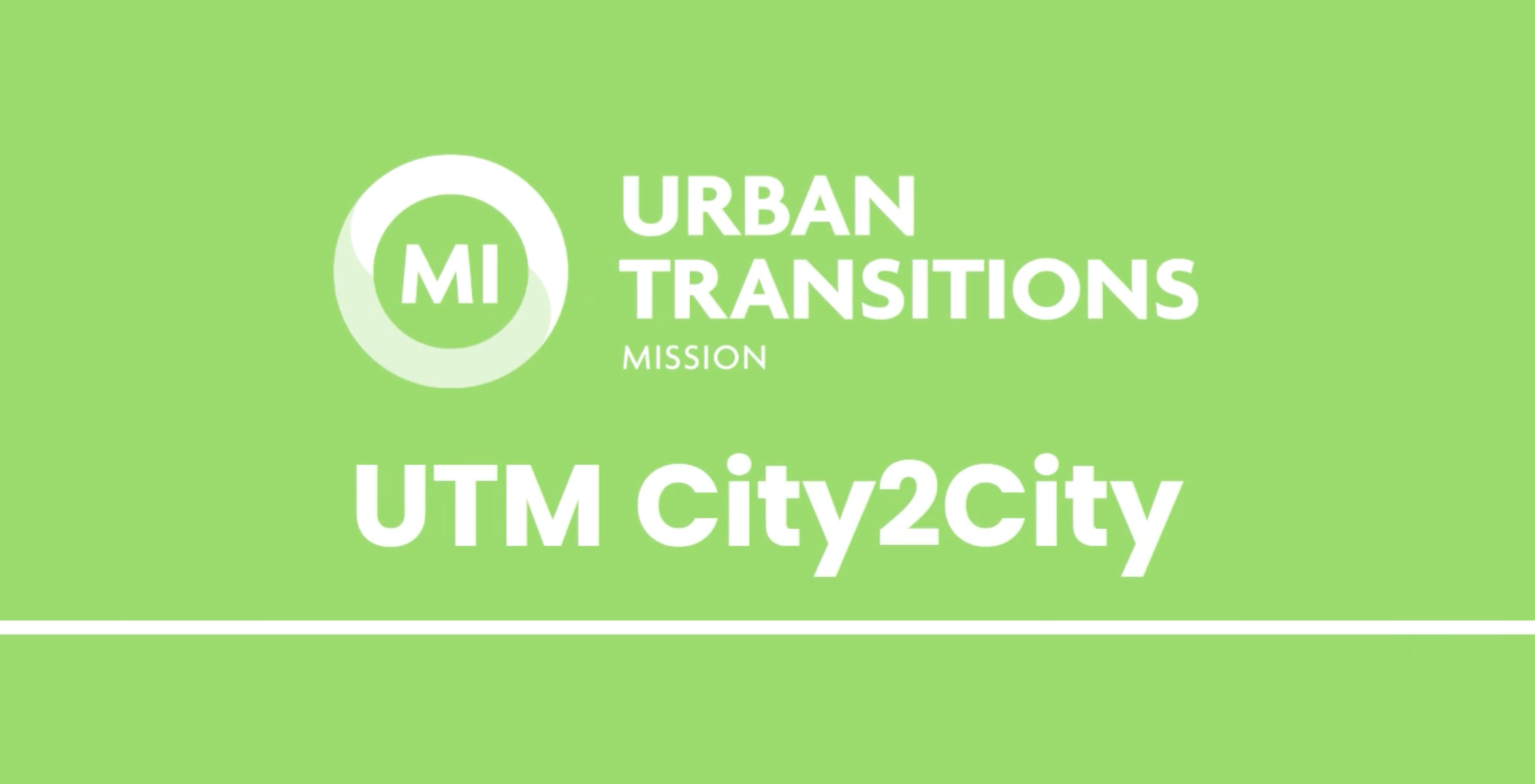UTM City2City is the Urban Transitions Mission’s global peer-learning programme to scale real-world climate solutions.
This is not training. This is innovation through co-creation.
UTM City2City is a space for mutual support, exchange, experimentation and innovation.
UTM City2City illustrates that a local solution can have a global reach.
UTM City2City strives for participants to leave the programme with a pilot.

The UTM City2City programme is already connecting 28 cities worldwide through 11 pairings to cooperate, co-create and identify solutions to pilot innovation to advance net-zero journeys.
The UTM is currently reviewing applications for its second call which closed on 22 January 2026.
About UTM CITY2CITY
UTM City2City is a new global twinning initiative connecting cities in dynamic peer-learning to co-create practical solutions for net-zero, resilient, people-centered urban futures.
With a 118 cities strong cohort, we want to facilitate small groups exchange to solve common challenges and accelerate innovative solutions together.
Cities engaging in the twinnings support each other to boost sustainable urban development towards net-zero strategy through a practical exchange on how to design, implement and manage sustainable urban practices in an integrated and ambitious way.
The UTM leverages existing relationships with the Global Covenant of Mayors (GCoM) and international experts (e.g., members of the UTM Global Innovation Alliance, UTM R&I Clusters, other Mission Innovation initiatives, etc.) to broker the co-creation of viable solutions fit-for-purpose and meeting your city’s own needs and ambitions.
With UTM City2City you get access to a global network of cities who share your challenges and your drive to find concrete solutions with the support of technical experts.


who are the cities in the UTM City2City programme
UTM City2City is open to all UTM cities of at least 50,000 inhabitants. The city must have a climate action plan/strategy covering the whole city (e.g., SECAP, SEACAP, CAP 2 or equivalent) – each municipality within an applicant consortium must also have its own equivalent plan/strategy in place. Participants to the programme are cities with ambitious goals and a drive to replicate inspirations that withstood practical testing and/or implementation.
Following the first call for expression of interest, 28 cities were selected from the growing UTM city cohort and from among cities looking to join the cohort. The selected cities exchange with their peers in 11 groupings of up to 3 cities on selected priority topics of mutual interest, as follows:
Darkhan (Mongolia) – Istanbul (Türkiye) – Valencia (Spain)
Guimarães (Portugal) – Renca (Chile)
Cuenca (Ecuador) – Mendoza (Argentina)
Ablekuma (Ghana) – Belo Horizonte (Brazil) – Salvador (Brazil)
Braga (Portugal) – Tegucigalpa (Honduras)
Miami-Dade (United States) – Porto Alegre (Brazil)
Bandirma (Türkiye) – Cascais (Portugal)
Barranquilla (Colombia) – Córdoba (Argentina) – Quelimane (Mozambique)
Kisumu (Kenya) – Sakarya (Türkiye) – Surat (India)
Çorlu (Türkiye) – Sekondi-Takoradi (Ghana) – Zhytomyr (Ukraine)
Baguio (The Philippines) – Chefchaouen (Morocco) – Leh (India)
A people-centred community aiming for solutions.
What does the UTM City2City programme offer?
This novel twinning programme helps UTM’s cohort – current and prospective cities – create a wider sense of community, experience innovation in urban transitions, define new training needs and R&I priorities, as well as identify and scale new pilot actions.
The UTM team is drawing on long experience from leading similar initiatives and exchange programmes to nurture an environment conducive for participating cities to learn valuable lessons from each other and from experts meant to help iteratively transform cities’ challenges into viable opportunities.
Experienced facilitators from the UTM team coordinate each twinning, organize all group sessions and guide cities’ interactive discussions between participants.
Focus on concrete action across the globe.
City representatives engaged in each UTM City2City pairing will meet at least four times over the course of a year, through series of interactive sessions:
- Interactive webinars & online workshops: to share knowledge on challenges faced, best practices, and to access expertise from academia and to explore innovative solutions.
- Virtual Networking Sessions: to foster partnerships between cities, researchers, and businesses engaged in the pairing.
- In-Person Exchange: to come together during the Global Innovation Summit and other key international events hosted in or attended by UTM cities. When relevant, UTM will facilitate study visits to a leading city to observe successful urban transition initiatives, meetings with local officials, and interactive work sessions.
Boost your innovation through cooperation.
The UTM team will be there every step of the way for your city as it builds up relevant capacities, from launching new twinnings to ensuring effective knowledge transfer to moderating the final showcase which could feature your city’s insights on a global stage.
Though the programme’s design aims to ensure that cities gain relevant expertise, its practical focus is aimed towards preparing the ground for concrete pilot actions to be implemented.
Key Phases
Matchmaking:
Open your city to dialogue and partnership with new global peers and relevant stakeholders (public and private)
Sharing:
Help others to solve issues by sharing your own experiences, testing innovative solutions and relaying lessons you have learned
Learning:
Get access to new ways of approaching challenges and benefit from knowledge from global experts and from a wider pool of urban good practices to draw upon
Showcasing:
Profile your best practices and achievements internationally
Piloting:
Work in a deep exchange environment with new partners who include academia and the private sector to make your vision of sustainable urban development a reality
12 thematic areas
UTM City2City focuses on the following twelve needs-based urban transitions priorities identified by UTM Cohort cities themselves:
100% renewable energy generation & technologies
Waste-to-energy
Housing/Net-zero buildings
Cooling planning, measures & technologies
Sustainable integrated lighting
Mobility, electric vehicle grid & storage
Clean hydrogen
Resilience of infrastructures
Sustainable ports/harbours
Digital twins & solutions
Data management
Blended finance, SPVs & green bonds
WOULD YOU LIKE TO EXPLORE UTM CITY2CITY FURTHER?
We’ve put together a comprehensive FAQ to help you find quick answers about the programme — including engagement, how to apply, implementation, and more.
If you can’t find what you’re looking for or have specific questions, don’t hesitate to reach out to us at utm@globalcovenantofmayors.org. Our team will be happy to assist you.

The UTM City2City programme is funded by the European Union under Grant Agreement n. 101102296 — MI UTM — HORIZON-MISS-2024-CIT-IBA of the Horizon Europe programme. Views and opinions expressed are those of the author(s) only and do not necessarily reflect those of the European Union.

